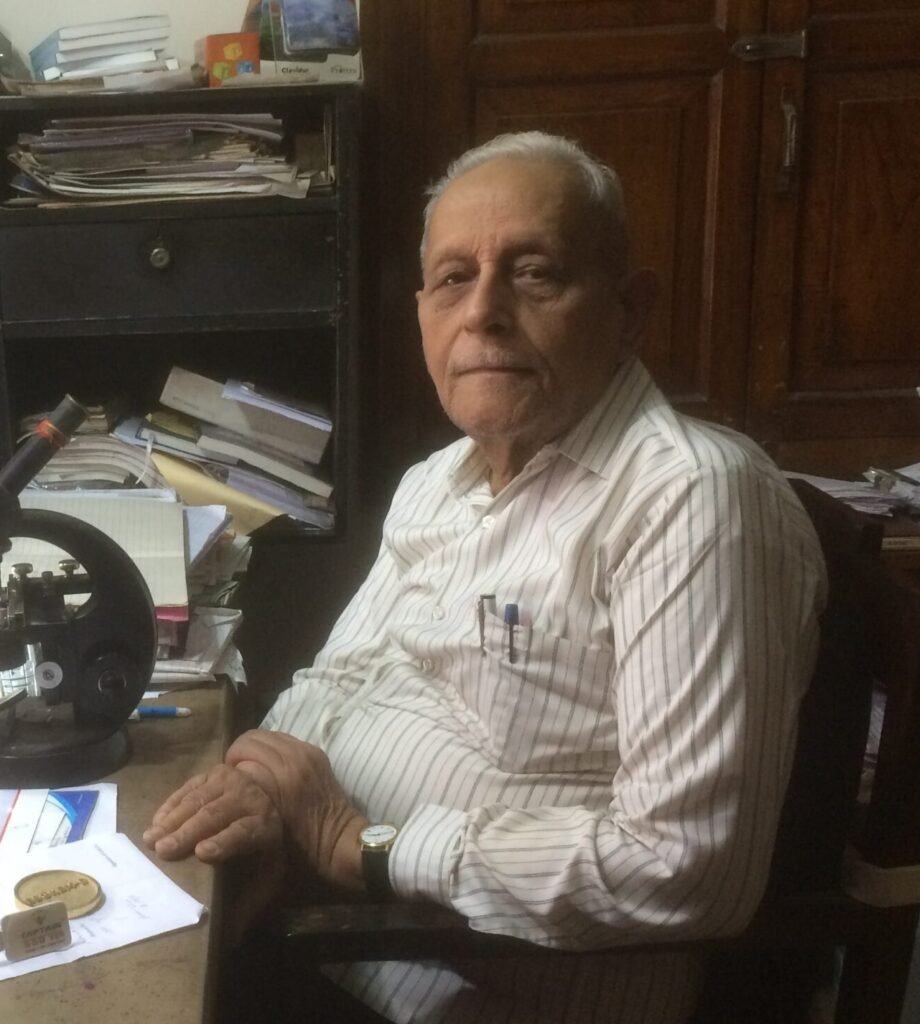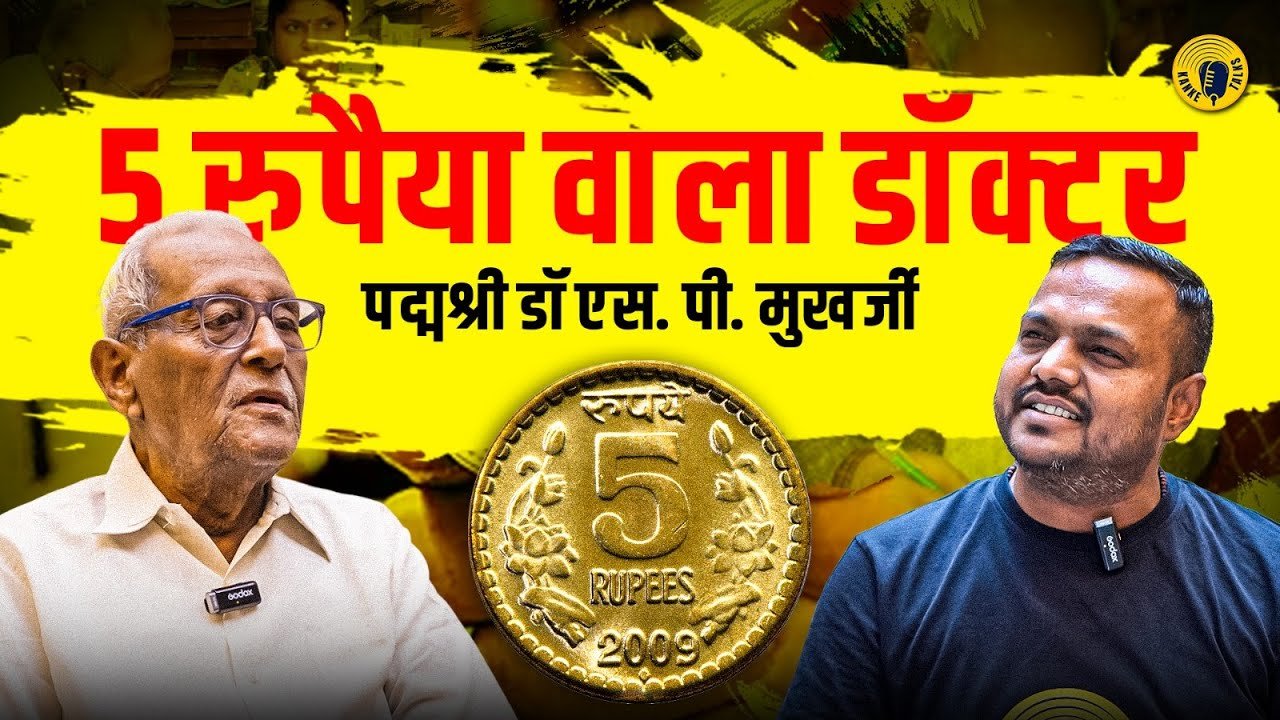In a time when the world runs on transactions, few pause to think about what it truly means to serve. In the heart of Ranchi, Jharkhand, lives an unassuming man who turned the world of medicine on its head — not through breakthroughs in science, but by curing something far deeper: the epidemic of indifference. Meet Dr. SP Mukherjee, the Padma Shri awardee who treats patients for just ₹5.

The Doctor Who Charges in Compassion
When asked how he feels about being called “the ₹5 doctor,” Dr. Mukherjee shrugs with humility. “I don’t feel joy in the title,” he says. “Happiness is when a child, once gasping for breath, returns smiling. That’s my real fee.”
For over five decades, Dr. Mukherjee has served Ranchi’s poorest children suffering from broncho-pneumonia, workers with high blood pressure, and mothers silently enduring arthritis — all treated with the same dedication that most associate with corporate hospitals.
His clinic doesn’t boast swanky furniture or digital queues. What it offers is harder to find genuine empathy.
A Solitary Path with a Million Companions
Dr. Mukherjee’s life wasn’t a pre-planned mission. There was no lightning bolt of inspiration, no dramatic turning point. Just a growing fire within, lit by the suffering he witnessed daily.
“The poor came with problems, and I couldn’t turn them away just because they didn’t have ₹800 to spare,” he explains. In a society driven by materialism, where gadgets outpace groceries, Dr. Mukherjee chose to walk a road less travelled — and largely unacknowledged.
“I’ve walked this road alone,” he says, “not for recognition, but because my conscience wouldn’t let me walk any other way.”
Rejecting Fame, Embracing Purpose
Celebrity status never fascinated him. Invited to “Kaun Banega Crorepati,” he didn’t go. Mukesh Ambani once handed him a cheque for ₹5 lakh; he didn’t spend a penny on himself. Instead, he put it in a fixed deposit to fund emergency medicines for the poor.
Many from India and abroad offered him more money, eager to contribute to his cause. But he refused — consistently.
“I don’t need more,” he says. “I don’t want to turn this into another business.”
The Teacher Who Shaped Thousands
Dr. Mukherjee isn’t just a healer — he’s a mentor. Over his 30-year teaching career, he trained over 3,000 doctors, many of whom now charge astronomical consultation fees. He doesn’t blame them but urges them:
“Fulfill your desires, buy what you want — but treat at least one poor patient for free every day. That’s all I ask.”
He believes that if every doctor in India did just that, we could rebuild society from the root.
Fighting the Medical Mafia
His honesty has made him a thorn in the side of the highly commercialized medical system. He speaks bluntly about doctors who prescribe unnecessary tests and insist on reports from select diagnostic centres — often because they receive a commission. He’s been warned, even threatened, by peers who blame his practice for “ruining the business.” But he remains unfazed.
“They say I should stop this ₹5 treatment because their clinics are failing. I say: let them fail if that’s what it takes to bring back ethics.”
Education and Merit: The Unspoken Divide
Dr. Mukherjee strongly opposes the commercialization of medical education. He believes that true merit is lost when degrees are bought with crores.
In his own time, the monthly medical college fee was just ₹1. He cracked one of the earliest entrance tests based on merit. Today, he laments the flood of private colleges that churn out doctors with deep pockets but shallow knowledge.
“This isn’t just about education,” he says. “It’s about what kind of doctors we are creating for tomorrow.”
The ₹5 Revolution Beyond the Clinic
Dr. Mukherjee’s low-cost clinic isn’t just about consultations. His network offers affordable diagnostic tests with genuine reports, cutting out commission-hungry middlemen. He challenges the idea that ethical service is unprofitable.
“Why pay commissions when you can offer discounts to the patient?” he asks.
The resistance he faces isn’t just from clinics but from an entire industry threatened by his model of care.
Fake Medicines and the Pharmaceutical Crisis
Another of his crusades is against fake and overpriced medicines. He educates people about how many “brands” are merely labels slapped onto the same product manufactured by someone else — often at multiple times the price.
He believes generic medicines — such as those promoted through the Jan Aushadhi scheme are not only effective but vital for poor patients. Yet, social perception gets in the way.
“People think a ₹5 pill can’t work if the consultation cost ₹500,” he says, highlighting how branding warps trust.
Modern Medicine’s Limits and Truths
He’s honest about the limits of modern medicine. Diseases like diabetes, thyroid, blood pressure, and arthritis — he admits — aren’t curable, just controllable. But he argues this isn’t unique to allopathy; even Ayurveda and homeopathy struggle with these conditions.
“The idea isn’t to debate the system,” he says. “The goal is to understand, empathize, and serve — whichever method you follow.”

Ayushman Bharat: A Good Idea Gone Wrong?
When asked about the Ayushman Bharat Yojana, he calls it a revolutionary idea but severely misused.
He shares chilling stories of fabricated surgeries — stones claimed but not removed, unnecessary fractures operated on — all for extra payouts. And while the scheme aims to democratize healthcare, he feels it’s been corrupted by greed.
“Again,” he says, “the problem isn’t the policy — it’s our honesty.”
A Simple Man in a Complex World
In a world obsessed with success stories featuring wealth, cars, and luxury, Dr. SP Mukherjee is an oddity. A man who hasn’t owned a fleet of cars, who doesn’t flash designer clothes or showcase a lavish home. And yet, he’s earned something much rarer — unshakable respect.
Even when old students mock him for not “upgrading” his life, he remains content. “They have 10 cars. I have peace.”
He doesn’t shame others for choosing money. He only requests, gently but firmly — serve one poor patient. Just one. Every day.
Legacy Without a Statue
He doesn’t need a building named after him or a bust in bronze. His legacy is etched in the eyes of mothers whose children survived, in the hands of old men gripping his in thanks, and in the quiet relief of families who walked into his clinic hopeless — and walked out healed.
He reminds us all that sometimes the loudest revolutions are whispered, that transformation can come not in one sweeping act but in one patient, one prescription, one ₹5 note at a time.
The Final Word: The Richest Poor Man
Dr. SP Mukherjee might be called poor by today’s standards. But in a world hollowed out by ambition and profit, he is rich — in purpose, in peace, and in people’s prayers.
In his own words, “How much do you need to eat roti and dal? Learn to be content with that. Everything else is noise.”
And that’s how the ₹5 doctor continues to heal a nation — not just through medicine, but through a heart that never closed its doors.

No responses yet